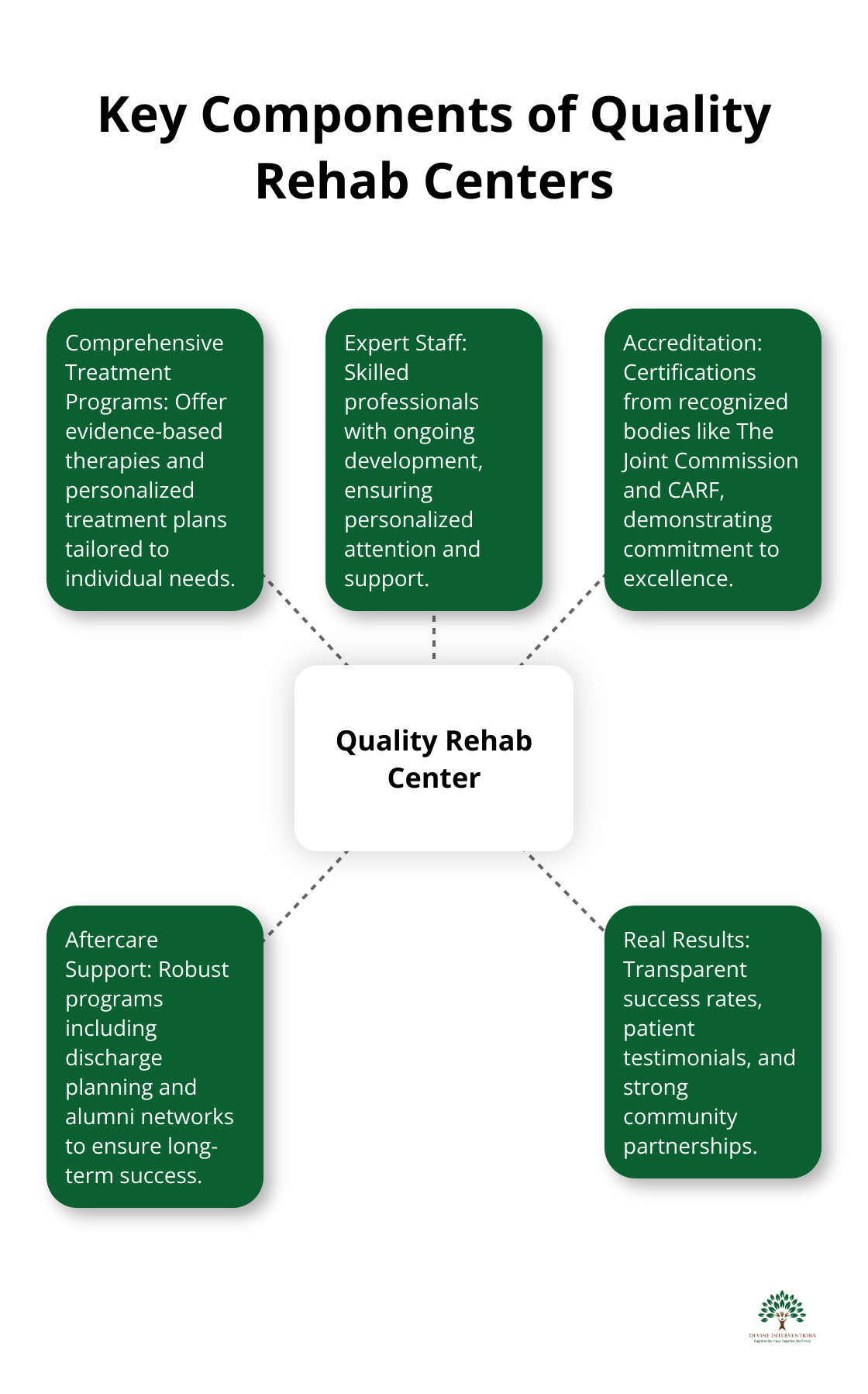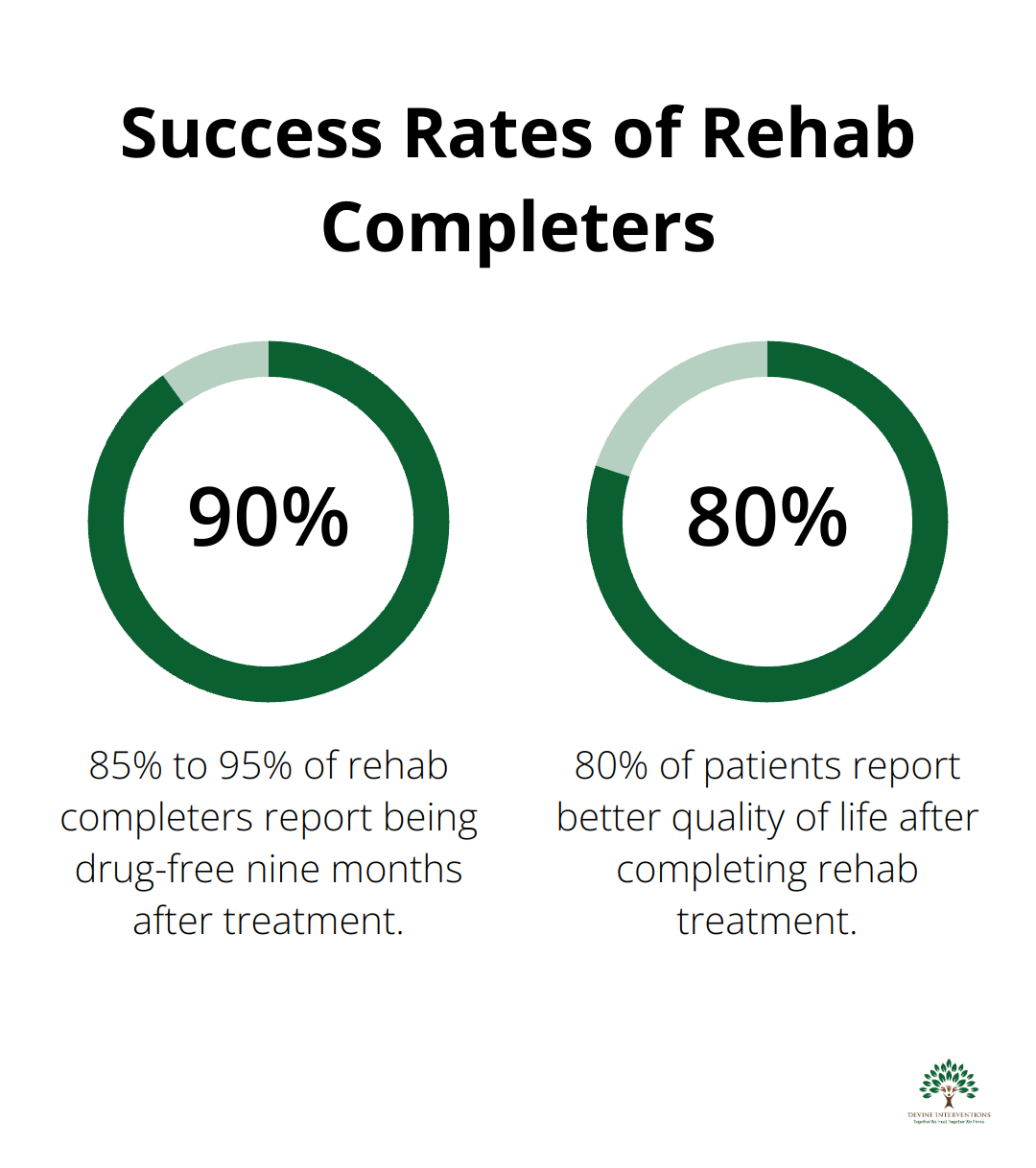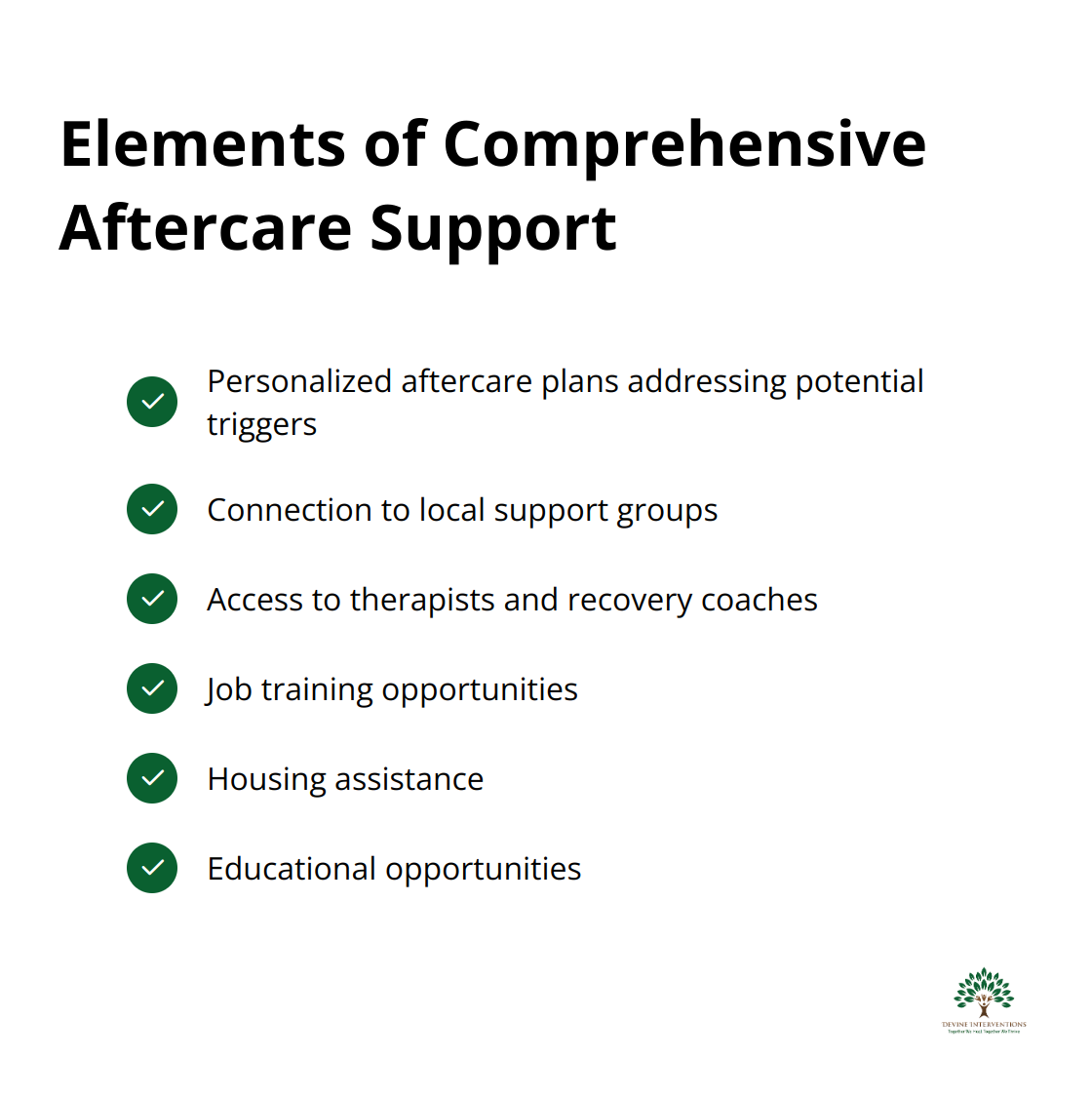Choosing the right rehab center is a critical step on the path to recovery. At Devine Interventions, we understand the importance of finding a facility that offers comprehensive care and support.
Quality rehab centers can make all the difference in your journey towards healing and sobriety. This guide will help you identify the key signs of a top-notch rehabilitation facility, empowering you to make an informed decision for your future.

1. Comprehensive Treatment Programs: The Foundation of Quality Rehab
Quality rehab centers offer a range of evidence-based therapies tailored to individual needs. Effective programs combine cognitive-behavioral therapy, motivational interviewing, and trauma-informed care to tackle the root causes of addiction. The best facilities also integrate holistic wellness practices and connect clients with community resources to support overall well-being.
Personalized treatment plans provide a wealth of benefits, including increasing your chances of achieving long-term sobriety. Top rehab centers conduct thorough assessments to create targeted strategies for each client. They offer specialized programs for various addictions and mental health conditions, ensuring that every individual receives the most appropriate care. This personalized approach addresses the unique challenges each person faces and sets the stage for lasting recovery.
A quality rehab center should provide:
- A variety of evidence-based therapies
- Personalized treatment plans
- Support for co-occurring disorders (dual diagnosis)
- Holistic wellness practices
The next crucial aspect to consider when evaluating a rehab center is the qualifications and experience of its staff. A team of skilled professionals can make all the difference in your recovery journey.
2. Expert Staff: The Backbone of Quality Rehab
A top-notch rehab center’s success hinges on its staff. Upscale addiction treatment centers are designed for clients who expect the highest level of attention and amenities, offering a more refined alternative to traditional rehab. These experts bring a wealth of knowledge and experience to each client’s recovery journey. A low staff-to-patient ratio ensures personalized attention and support throughout treatment. This approach allows professionals to develop deep insights into each client’s unique needs and challenges, leading to more effective outcomes.
Ongoing staff development sets apart exceptional rehab centers. The field of addiction treatment evolves rapidly, and quality facilities invest in their team’s growth. They keep staff updated on the latest evidence-based practices and treatment modalities. When evaluating a rehab center, try to ask about staff qualifications and their commitment to continuous learning. A facility that values professional development will likely provide cutting-edge, effective care that can make a real difference in your recovery process.
The next critical factor in choosing a quality rehab center is its accreditation and licensing. These credentials serve as a testament to the facility’s commitment to high standards of care and safety.
3. Accreditation: The Mark of Quality Rehab
Accreditation serves as a key indicator of a rehab center’s commitment to excellence. The Joint Commission and the Commission on Accreditation of Rehabilitation Facilities (CARF) evaluate rehab facilities based on industry standards, patient safety protocols, and quality of care. Top-tier centers proudly display their accreditations and maintain transparency about their certifications. We encourage potential clients to ask about a facility’s credentials and to verify this information with the relevant accrediting bodies or state agencies.
State licensing adds another layer of credibility to quality rehab centers. Each state imposes specific requirements for rehab facilities, which cover aspects like staff qualifications, facility conditions, and treatment protocols. Reputable centers readily provide information about their compliance with these regulations. Quality rehab facilities maintain all necessary accreditations and licenses, ensuring clients receive care that meets the highest industry standards. The next critical factor in choosing a quality rehab center focuses on the support provided after the initial treatment phase ends.

4. Aftercare Support Ensures Long-Term Success
Quality rehab centers prioritize long-term recovery through robust aftercare programs. Comprehensive discharge planning significantly reduces relapse rates, especially for youth, by ensuring continued care following hospital discharge. The team works closely with clients to create personalized aftercare plans, which address potential triggers and establish a support network. Top facilities connect clients with local support groups, therapists, and recovery coaches to ensure a smooth transition back to daily life.
Alumni programs play a vital role in maintaining sobriety post-treatment. These programs offer ongoing support, educational workshops, and social events that foster a sense of community among recovering individuals. Strong partnerships with community organizations provide clients access to essential resources that support their recovery journey:
- Job training
- Housing assistance
- Educational opportunities
- Financial counseling
This comprehensive approach to aftercare sets the foundation for lasting success and empowers individuals to build fulfilling lives in recovery. The next critical factor in choosing a quality rehab center focuses on the tangible results and reputation of the facility.

5. Real Results Matter Most in Rehab
Quality rehab centers proudly showcase their success rates and patient outcomes. When you research facilities, look for centers that openly share their statistics on sobriety rates, program completion, and long-term recovery. These numbers offer valuable insights into a center’s effectiveness. For instance, 85% to 95% of rehab completers report being drug-free nine months later, with 80% of patients reporting better quality of life after treatment. Testimonials from former patients provide a window into the rehab experience and can help you gauge if a facility’s approach aligns with your needs.
A rehab center’s reputation within the recovery community speaks volumes about its quality. Respected facilities often collaborate with local support groups, healthcare providers, and community organizations. This network of partnerships indicates a center’s commitment to holistic, long-term recovery. Don’t hesitate to ask about a center’s community involvement and partnerships – it’s a key indicator of their dedication to your lasting recovery. For example, Refresh Recovery Centers in Norwell, MA, offers comprehensive drug and alcohol addiction treatment with Full-Day Treatment Program (FDT) and Half-Day programs, demonstrating their commitment to community involvement. Consider these factors when evaluating potential rehab options:
- Success rates and program completion statistics
- Patient testimonials and reviews
- Community partnerships and involvement
- Reputation among healthcare professionals
The next step in your journey to recovery involves making an informed decision based on the information you’ve gathered about quality rehab centers.
Final Thoughts
Choosing a quality rehab center requires careful consideration of several key factors. Comprehensive treatment programs, expert staff, proper accreditation, robust aftercare support, and positive patient outcomes all contribute to a center’s effectiveness. These elements work together to provide personalized care that addresses the complex nature of addiction and mental health challenges.
Personal research and consultation will help you find the right fit for your unique needs. We at Devine Interventions understand the courage it takes to seek treatment and offer a range of services to support your path to wellness. Our team of dedicated professionals believes in the power of compassionate care to transform lives.
Don’t let uncertainty stop you from reclaiming your life. Rehab centers like Devine Interventions can guide you through every step of your recovery journey. Take that brave first step today – your path to healing and hope begins here.







